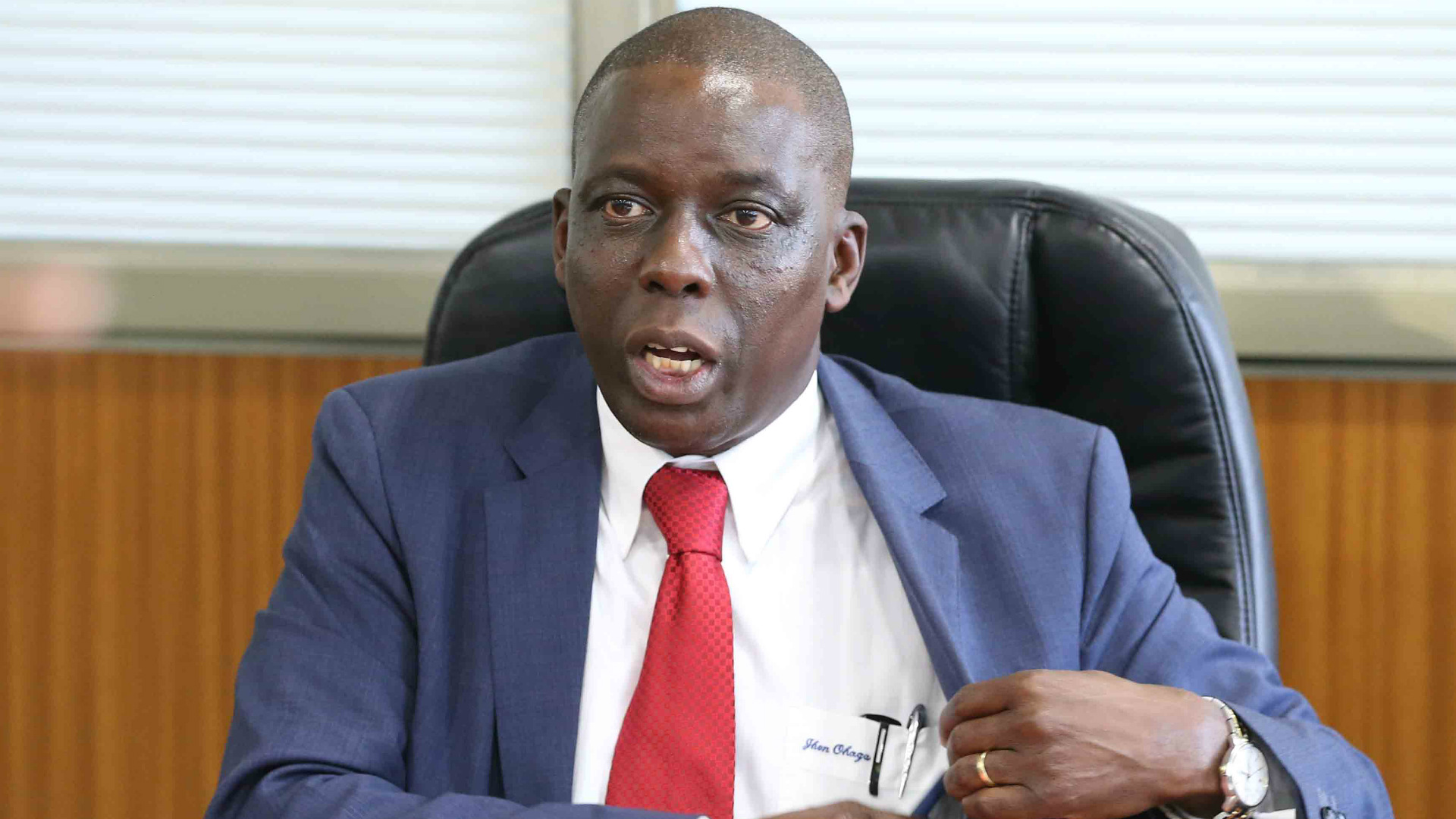Sports Disputes Tribunal has ruled that the Office of the President of Football Kenya Federation is not synonymous with the National Executive Committee.
The landmark ruling could now have far-reaching implications on decisions taken by the outgoing FKF president Nick Mwendwa since his term of office expired on February 10 this year such as declaring Gor Mahia champions of the Kenyan Premier League (KPL) for the 2019/2020 season on April 30.
The decisions to relegate from or promote teams to the KPL and also in the second-tier National Super League are now in serious jeopardy and so is the Sh1.2billion KPL naming rights deal with BetKing Kenya announced by Mwendwa via twitter on July 15, all which require the approval of the FKF National Executive Committee.
The ruling follows a subsidiary application by interested parties to the SDT Case 3&5 of 2020 after the FKF CEO Barry Otieno wrote a letter dated July 8 purporting to invite FKF Branch chairmen for a post-Covid-19 planning meeting in Nairobi despite their term of office having ended.
The letter addressed to ‘FKF branch chairmen’ reads in part: “…the FKF National Office wishes to invite you to Nairobi for a post-COVID-19 return to football planning meeting, to be held at FKF Goal Project, Kasarani…”.
The petitioners, represented by lawyers Nelson Odongo of Kerandi Manduku & Co. Advocates, Amos Otieno and journalist Milton Nyakundi appearing in person as an interested moved to the SDT on July 13 seeking a determination of the import and purport of Otieno’s letter. They sought the SDT to declare any conclusions to be arrived at after the scheduled meeting to be declared null and void.
Former Law Society of Kenya chairman, Senior Counsel Tom Ojienda, and Victor Omwebu appeared for Football Kenya Federation, who argued that Mwendwa was free to exercise his powers as conferred in the FA’s constitution.
In their argument, the petitioners held that the decisions of such a forum convened by the FKF CEO Otieno on behalf of the FKF president were unlawful as it required the approval of the FKF NEC, which does not exist pending the stalled elections.
Lawyer Odongo and journalist Nyakundi said that the forum, convened by the President of the FKF significantly undermined the integrity of the decision of the Tribunal rendered on March 17, which declared the term of office of the National Executive Committee (NEC) to be at an end.
Odongo said: “The first bone of contention that we have is that term of ‘FKF national office.’ We do believe that what Barry Otieno was referring to is an FKF National executive committee, whose term this Court declared had ended.
“So, what is this national office that is being described here? We are cognizant of the fact that court declared that the term of office of the FKF president continues to run, but we do submit that that does not mean that the president in himself is the national office as it includes the entire national executive committee,” Odongo argued.
Secondly, Odongo contended that the parties the letter addressed as “branch chairman” was erroneous and illegal as the March 17 ruling declared the elections the FKF had intended for March this year a nullity and therefore “FKF branch Chairman” does not exist.
“So, the question we are asking you (SDT) is who are they inviting to join this meeting and in what capacity and if indeed these branch Chairman in quotes, sat down and had a meeting, of course the decisions and deliberation that came out of that meeting are illegal and in contempt of orders of this court,” Odongo said in his oral submissions.
Odongo referred the SDT Panel to Article 46(2) and Article 37 of the FKF Constitution which indicates the composition of the NEC.
He said: “The only remaining member of the National Executive Committee is the President and his office is not as a National Executive committee member, but just as a President.”
He argued further that, “the roles of the National Executive Committee cannot be held by one person being the president and that the letter dated July 8, 2020 by Barry Otieno is illegal because it purports to give powers not stipulated by FKF’s Constitution.”
He added: “While the President is still in office as ruled by the SDT, his role is limited to the extent provided for under article 42.”
Journalist Nyakundi submitted that in convening the subject meeting, the President was acting without authority.
“He (Mwendwa) was attempting to take decisions on matters which were in the exclusive domain of the National Executive Committee and if this was allowed to continue it would set a dangerous precedent for future Presidents and officials of the Federation,” Nyakundi submitted.
However, Senior Counsel Ojienda acting for FKF said the petitioners’ applications were advanced premised on a misunderstanding of Article 43(2) of the FKF Constitution.
“Article 42 gives the President of the FKF the mandate to ensure the effective functioning of bodies of FKF which includes the running of the Secretariat,” Ojienda said.
“There was no contradiction between the letter of July 8 2020 and the steps taken by the President to convene the meeting to discuss matters which were relevant to the running of football and in any event, the matters sought to be agitated by the Applicants had been ruled on in SDT 3&5 of 2020 on March 17,” he stated.
What the SDT said
In the end, however, the SDT agreed with the petitioners represented by Odongo and Nyakundi that the letter dated July 8, 2020 issued by FKF calling for a Post COVID-19 Planning meeting was without lawful basis and that the Office of the President of Football Kenya Federation is not synonymous with the National Executive Committee.
The SDT panel comprising Senior Counsel John Ohaga (chair), Njeri Onyango and Mary Kimani said: “We note that the construction of the FKF Constitution does not provide for the President to solely undertake meetings through his own motion and the same must be either through General or Special Meetings or those spearheaded by committees in undertaking their designated tasks under the Constitution and the same is subject to the requisite constituent members. This, therefore, requires a NEC to be in place.”
The SDT further emphasised its decision dated March 17, 2020, which declared that at the term of office of NEC is at an end.
In the reasoned ruling, the SDT observed that the FKF president is bound by the FKF Constitution and therefore can only operate in the interests of FKF within the limits of the office especially the assumed status in Article 43(2).
“Being the existing member of NEC still sitting at their appointed seat, the President’s powers are limited to the extent of those activities that the office can undertake as FKF. In conjunction with the office of the General Secretary as highlighted in Articles 62 and 63, the Respondents cannot subvert the directions of the Tribunal or the FKF Constitution which requires certain thresholds as to membership of the Bodies of FKF to be met in order for proper management and administration and decision making of FKF to ensue.”
It added: “The Respondents in advancing their case stated, though it is a position held by this Tribunal to be misguided, that the President has unlimited powers under the guise of Article 42(2)(ii), (iii) and (iv) to call for a meeting with the immediate NEC officials and chairpersons to discuss various issues. The same is not in tandem with the FKF Constitution and can be said to be an extrapolation of the provisions of Article 43(2) which provision only applies to the office of the President until fresh elections are held.”
SDT Ruling of September 1, 2020
- A declaration be and is hereby issued that the letter dated 8th July 2020 issued by the Respondent calling for a Post Covid-19 Planning Meeting was without lawful basis though the existence of a meeting following the issuance of the letter was not substantiated by the Applicants;
- A declaration be and is hereby issued that the Office of the President of FKF is not synonymous with the National Executive Committee and the same should be constituted in line with the relevant Articles of the FKF Constitution and in adherence with the decision of this Tribunal dated 17th March 2020 to enable the FKF hold meetings in line with the FKF Constitution;



CAF Confederation Cup
Simba book final spot in CAF Confederation cup
Must See
-


AFRICA
/ 5 years agoSierra Leone FA President Isha Johansen endorses Patrice Motsepe for CAF President
Sierra Leone FA President who also doubles up as CAF Executive Council member Madam...
-


Football
/ 5 years agoIT JUST CAN NOT BE – AN AFRICA FULL OF MORONS?
By John De Mathews, There is an eerie silence around Africa, and it is...














